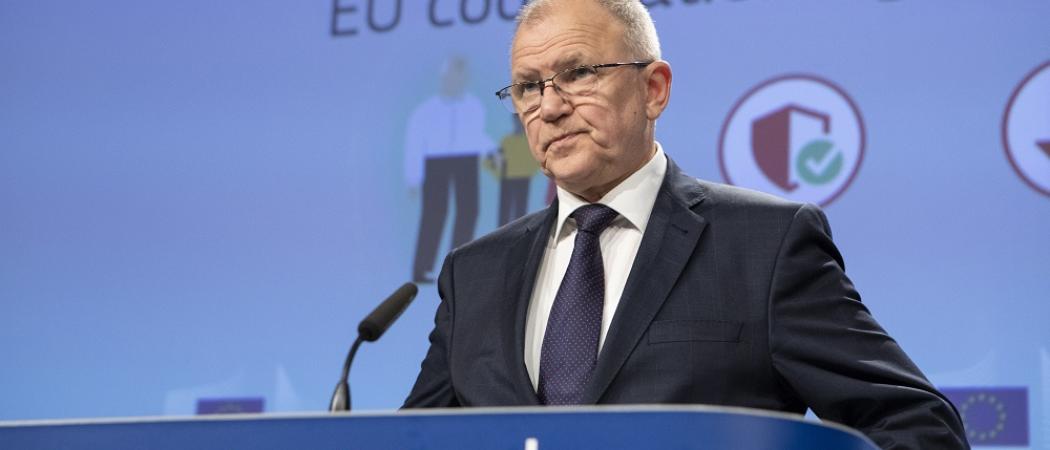Current EU health chief plays down fear from civil society groups that next Commission will drop EU health role

Andriukaitis, sceptical of rumours about his portfolio
EU Health and Food Safety Commissioner Vytenis Andriukaitis says he doesn’t believe gossip that his portfolio could disappear under future leadership of the European Commission, as part of a mooted reorganisation in Brussels.
“There have been many rumours circulating that there will be no health commissioner in the next term,” Andriukaitis said in an emailed statement to Science|Business “I don’t believe that.”
The latest alarm over the direction of EU health sounded this week after the Commission published detailed plans for its next seven-year budget – known as the multiannual financial framework, or MFF – which sees some of its main health initiatives consolidated with several other programmes into an enlarged European Social Fund, known in Brussels as ESF+. The proposed budget for health for 2021 through 2027, €413 million, was down 8 per cent on the current period.
Sources say the reorganisation is part of a Commission-wide effort to simplify the way its diverse programmes operate, by reducing the number of separate legal instruments and making it easier to transfer funds from one budget pot to another.
But the shift, which must be approved by the EU’s 28 member states, was characterised by one lobby group, Global Health Advocates, as a “downgrade in political ambition” on health. “We can rightly ask ourselves whether we are going to lose the post of Commissioner for Health in the next MFF,” the NGO said in a statement Wednesday.
Persistent rumours
Rumours of a rollback of EU involvement in health date as far back as March 2017 after the Commission published a white paper, ‘The Future of Europe’, in which one scenario depicts public health as an area of "limited added value." A persistent fear is that the EU’s health directorate, DG Sante, could be closed and its responsibilities redistributed among other Commission departments (the idea has been dismissed previously by the Commission’s director general for health and food safety, Xavier Prats Monné).
The question will come to a head late in 2019, when a new Commission is to be appointed – with one fewer member-state to fill a chair. At the least, one portfolio will be dropped; but there could be more.
Responding to fears over the direction of EU health, and the long-term stability of his post, Andriukaitis said: “[The] health strand is described in a very detailed manner in the new programme, and many actions and initiatives are foreseen. I don’t see how this can be put in place without Commissioner in charge of health.”
EU health policy, which operates with a relatively small budget by EU budget standards, is secure for the foreseeable future, chief spokesperson of the Commission, Margaritis Schinas, added on Thursday: “The Juncker Commission is very proud to have a very talented, performing efficient politician like commissioner Andriukaitis. We are very happy both with the commissioner and the portfolio.” But he didn’t respond directly to the question of what might happen in the next Commission.
The health programme covers several cross-border health threats, and provides money for expert networks for rare diseases, AIDS, smoking and other health problems; information sharing among EU members on health systems and technologies; and several other health activities. These basic activities remain largely unchanged in the new budget, published on Wednesday. In addition, the EU’s research programme, Horizon 2020, includes €7.47 billion for health research projects; they would not be affected by the reorganisation.
A restricted role
Debate over EU influence in health is nothing new – there are always competing visions within the EU28 over the role of the Commission. By treaty, healthcare is a matter for the member states to manage on their own; and the Commission’s role is restricted to cross-border and research and innovation issues. Some countries favour a more activist executive, whileothers are naturally wary of vesting the Commission with more political power.
“Let's not forget that there will be 27 to finance this budget and not all member states agreed on [a] more ambitious MFF budget. The fact that cuts are made should be no surprise,” Andriukaitis said.
Despite having less money to work with in the future, the Commission proposal succeeds by taking “a holistic approach” to health, the Lithuanian commissioner continued. “We want to ensure that there will be real synergies – health related projects will be financed not only via the health strand under ESF+, but also through other EU financial instruments.
“For instance, more money should be allocated to research where health projects are very prominent, more will be given to digitalisation – eHealth and interoperability is also there,” he added.





 A unique international forum for public research organisations and companies to connect their external engagement with strategic interests around their R&D system.
A unique international forum for public research organisations and companies to connect their external engagement with strategic interests around their R&D system.